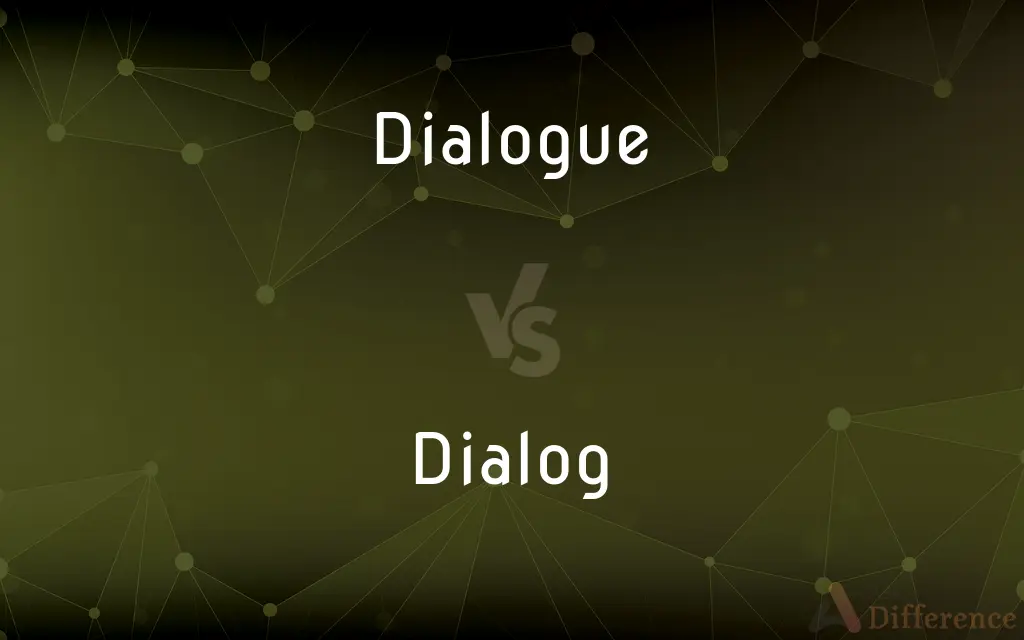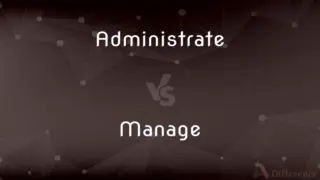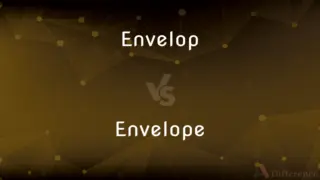Dialogue vs. Dialog — What's the Difference?
By Fiza Rafique & Maham Liaqat — Updated on April 30, 2024
"Dialogue" primarily refers to a conversation between two or more people, often used in various forms of writing, while "dialog" is a variant spelling more commonly used in American English, especially in computing contexts.

Difference Between Dialogue and Dialog
Table of Contents
ADVERTISEMENT
Key Differences
Dialogue is a term used extensively in literature, film, and real-life conversations to denote an exchange of ideas or spoken words between two or more individuals. It emphasizes the interactive and reciprocal nature of communication. On the other hand, dialog is an alternative spelling that is especially prevalent in American English, often seen in technical and computing contexts, such as referring to a dialog box on a computer screen.
In literary and theatrical scripts, dialogue plays a critical role in character development and plot advancement, serving as a primary means through which characters express their thoughts, emotions, and actions. In contrast, a dialog box in computing is a graphical control element that prompts the user to make decisions or enter information, facilitating interaction between the user and the computer.
The usage of dialogue in philosophy and education often aims to explore philosophical ideas or teach through conversational techniques. Meanwhile, dialog, when used in the context of user interfaces, focuses on utility and efficiency, providing users with clear and concise options for interaction.
While both terms can be used interchangeably in general English, especially in American English where "dialog" is a common spelling for any kind of discussion, "dialogue" is preferred in formal writing and detailed discussions of conversational dynamics due to its traditional and nuanced connotations.
In international and multilingual settings, "dialogue" is often used to describe diplomatic or intercultural communications, aiming to foster understanding and cooperation between different parties. This use underscores the term's association with thorough, expansive, and meaningful conversation, as opposed to "dialog," which may refer to more functional and straightforward exchanges, such as those between a user and a software application.
ADVERTISEMENT
Comparison Chart
Definition
Conversation between two or more parties.
Alternate spelling of dialogue, often used in computing.
Common Usage
Literature, films, real-life conversations.
Computing contexts, e.g., dialog boxes.
Focus
Interactive communication, character and idea exploration.
User interaction, software prompts.
Preferred in
Formal writing, discussions on communication dynamics.
American English, especially in technical and UI design.
Example of Usage
The novel features rich dialogue that reveals character depth.
The software update introduced a new dialog box for settings.
Compare with Definitions
Dialogue
A discussion aimed at resolving a conflict or reaching an understanding.
The community leaders engaged in a dialogue to address local concerns.
Dialog
Specifically refers to a dialog box in computing that prompts user interaction.
Clicking the icon opens a dialog box asking if you wish to save your changes.
Dialogue
Exchanges that occur in academic or philosophical contexts to explore ideas.
The university seminar encouraged dialogue among students from diverse backgrounds.
Dialog
In software development, relates to elements that facilitate user communication.
The application's user interface includes several interactive dialogs for settings adjustments.
Dialogue
A conversation between two or more people as a feature of a book, play, or movie.
The director praised the actors for their natural delivery of the dialogue.
Dialog
Occasionally used to describe brief and functional exchanges in professional settings.
The technician’s dialog with clients often involves troubleshooting steps.
Dialogue
Used metaphorically to describe any exchange or communication process.
Her artwork creates a visual dialogue with viewers, challenging their perceptions.
Dialog
Used in technical contexts to describe interfaces.
He designed the dialog to simplify data entry for users.
Dialogue
In historical or diplomatic terms, formal discussions between nations or groups.
The peace dialogue between the warring nations was brokered by the United Nations.
Dialog
An alternative spelling for dialogue, used primarily in American English.
The scriptwriter edited the dialog to make the characters' speech more realistic.
Dialogue
Dialogue (sometimes spelled dialog in American English) is a written or spoken conversational exchange between two or more people, and a literary and theatrical form that depicts such an exchange. As a philosophical or didactic device, it is chiefly associated in the West with the Socratic dialogue as developed by Plato, but antecedents are also found in other traditions including Indian literature.
Dialog
Variant of dialogue.
Dialogue
A conversation between two or more people.
Dialog
A conversation or other form of discourse between two or more individuals.
Dialogue
A discussion of positions or beliefs, especially between groups to resolve a disagreement.
Dialog
In a dramatic or literary presentation, the verbal parts of the script or text; the verbalizations of the actors or characters.
Dialogue
Conversation between characters in a drama or narrative.
Dialog
A literary form, where the presentation resembles a conversation.
Dialogue
The lines or passages in a script that are intended to be spoken.
Dialog
(computing) A dialog box.
Dialogue
A literary work written in the form of a conversation
The dialogues of Plato.
Dialog
To discuss or negotiate so that all parties can reach an understanding.
Dialogue
(Music) A composition or passage for two or more parts, suggestive of conversational interplay.
Dialog
A conversation between two persons
Dialogue
To express as or in a dialogue
Dialogued parts of the story.
Dialog
The lines spoken by characters in drama or fiction
Dialogue
To engage in a dialogue.
Dialog
A literary composition in the form of a conversation between two people;
He has read Plato's Dialogues in the original Greek
Dialogue
A conversation or other form of discourse between two or more individuals.
Bill and Melinda maintained a dialogue via email over the course of their long-distance relationship.
Start up a dialogue
Dialogue
(authorship) In a dramatic or literary presentation, the verbal parts of the script or text; the verbalizations of the actors or characters.
The movie had great special effects, but the dialogue was lackluster.
Dialogue
(philosophy) A literary form, where the presentation resembles a conversation.
A literary historian, she specialized in the dialogues of ancient Greek philosophers.
Dialogue
(computing) A dialogue box.
Once the My Computer dialogue opens, select Local Disk (C:), then right click and scroll down.
Dialogue
To discuss or negotiate so that all parties can reach an understanding.
Pearson wanted to dialogue with his overseas counterparts about the new reporting requirements.
Dialogue
(transitive) To put into dialogue form.
Dialogue
(obsolete) To take part in a dialogue; to dialogize.
Dialogue
A conversation between two or more persons; particularly, a formal conservation in theatrical performances or in scholastic exercises.
Dialogue
A written composition in which two or more persons are represented as conversing or reasoning on some topic; as, the Dialogues of Plato.
Dialogue
To take part in a dialogue; to dialogize.
Dialogue
To express as in dialogue.
And dialogued for him what he would say.
Dialogue
A conversation between two persons
Dialogue
The lines spoken by characters in drama or fiction
Dialogue
A literary composition in the form of a conversation between two people;
He has read Plato's Dialogues in the original Greek
Dialogue
A discussion intended to produce an agreement;
The buyout negotiation lasted several days
They disagreed but kept an open dialogue
Talks between Israelis and Palestinians
Common Curiosities
Is there a difference in meaning between dialogue and dialog?
In general usage, they can mean the same thing, but "dialog" is specifically used in computing contexts.
Can I use dialog instead of dialogue in a novel?
While "dialog" is acceptable, "dialogue" is preferred in literary and formal contexts for clarity and tradition.
How does the usage of dialogue in philosophy differ from its everyday use?
In philosophy, dialogue often involves deeper exploratory discussions intended to uncover truths or understand complex ideas, beyond simple conversational exchange.
Why is dialogue important in literature?
Dialogue is crucial for character development, advancing the plot, and providing insight into character motives.
How should I choose between dialogue and dialog in my writing?
Consider your audience and the context: use "dialogue" for traditional and formal contexts, and "dialog" for American audiences or when referring to computing elements.
What is the purpose of a dialog box in computing?
A dialog box helps facilitate interaction between the computer program and the user, often for obtaining information or confirming actions.
Is one spelling more correct than the other?
Both spellings are correct, but their usage may depend on regional preferences or specific contexts.
Can the term dialog be used in formal writings?
It's generally best to use "dialogue" in formal writings, especially outside of American English contexts or non-technical topics.
What are some examples of dialog in user interface design?
Examples include error messages, information prompts, and configuration settings dialogs in software applications.
Does the preference for dialogue or dialog affect the understanding of text?
Generally, the context clarifies the meaning, but using the more specific "dialogue" can prevent ambiguity in detailed or international texts.
Share Your Discovery

Previous Comparison
Administrate vs. Manage
Next Comparison
Envelop vs. EnvelopeAuthor Spotlight
Written by
Fiza RafiqueFiza Rafique is a skilled content writer at AskDifference.com, where she meticulously refines and enhances written pieces. Drawing from her vast editorial expertise, Fiza ensures clarity, accuracy, and precision in every article. Passionate about language, she continually seeks to elevate the quality of content for readers worldwide.
Co-written by
Maham Liaqat















































